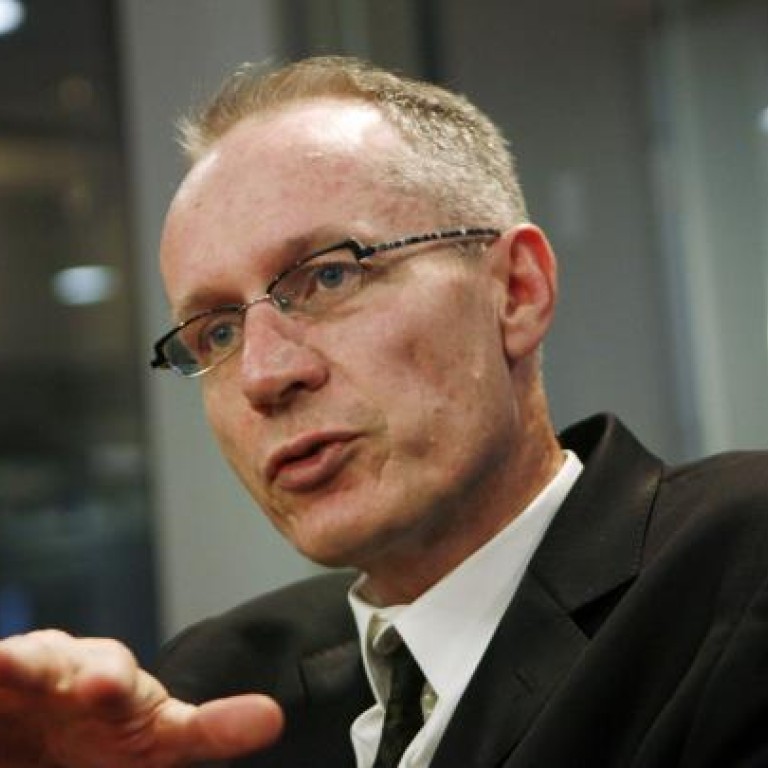
News Corp will use Fox name as it moves ahead with breakup
News Corp, moving ahead with a plan to split into two companies, appointed Wall Street Journal editor Robert Thomson as head of the new publishing entity and said it would call the entertainment-focused business Fox Group.
The publishing business, which includes the Journal and the Times of London, will retain the News Corp name, News Corp said in a statement. As part of the split, it will cease publication this month of the Daily, an iPad publication that struggled to catch on with readers.
News Corp. agreed in June to break off its slower-growing publishing assets from its Fox television and film businesses after coming under pressure from shareholders. Rupert Murdoch, the billionaire founder of News Corp., will remain CEO of the Fox side, with Chase Carey serving as chief operating officer and James Murdoch working as Carey’s deputy.
“The challenges we face in the publishing and media industries are great, but the opportunities are greater,” Murdoch said in the statement.
News Corp. shares were little changed in New York trading, closing at US$24.53 on Monday. The stock has climbed 38 per cent this year.
The Daily’s editor-in-chief, Jesse Angelo, will become publisher of News Corp.’s New York Post. Paul Carlucci, now the Post’s publisher, will focus exclusively on his role as chairman of News America Marketing.
Thomson ascends to the CEO job after serving as managing editor of the Journal and editor-in-chief of News Corp’s Dow Jones. Gerard Baker, a fellow Times of London alumnus who is currently Thomson’s deputy, will take over as managing editor.
Putting Thomson in charge of the publishing spinoff will help Murdoch preserve his vision for the company, said Ken Doctor, an analyst at Outsell Inc., a California- based research firm.
“Robert Thomson has been well-schooled in the College of Murdoch,” said Doctor, who covers the publishing industry. “They have long worked closely, and, in a sense, this is a continuation of that partnership.”
In choosing Thomson, Murdoch passed over Tom Mockridge, CEO of News International, the company’s UK publishing group. Mockridge now plans to step down by the end of the year, News Corp. said. Mike Darcey, currently chief operating officer at pay-TV operator British Sky Broadcasting Group, will replace Mockridge.
Murdoch appointed Thomson, a fellow Australian, to run the Journal in 2007 and named him head of Dow Jones the following year. Thomson, 51, had served as editor of the Times of London, where he bolstered Internet readership. Before that, he was editor of the US edition of the Financial Times.
The new job would entrust the management of a global media corporation to a career journalist, rather than an experienced CEO. Thomson has worked in newspapers since 1979, when he began as a copyboy at the Herald in Melbourne.
Thomson will need to reinvigorate a business suffering from shrinking profit and a scandal at its UK newspapers. Even so, the operation will have a clean balance sheet, with no debt and “very large reserves of cash,” Murdoch said when the plan was proposed in June.
Murdoch will remain chairman of both entities after the spinoff. That means the outspoken 81-year-old will continue to loom large at the new business, Doctor said.
“There’s little room between Murdoch as chairman of the new company and Thomson as CEO,” he said.
In the new role, Thomson will have to confront a lingering scandal in the UK. News Corp closed its News of the World newspaper in July 2011 in response to public anger over revelations that journalists accessed messages on a murdered schoolgirl’s mobile phone nearly a decade earlier. The investigation spawned parallel probes of computer hacking and bribery and led to the arrests of more than 80 people, including the unit’s former head of security and its top lawyer.
Mockridge had replaced Rebekah Brooks last year as head of the UK division in the wake of the scandal, so Darcey’s appointment means the unit has named three CEOs in less than 18 months.
In addition to operating the Wall Street Journal and Times of London, the spinoff will include other newspapers in the US, UK and Australia; as well as the HarperCollins book division; the education and marketing assets; and the Australian TV business. News Corp plans to complete the breakup by the middle of next year, though Thomson will begin working as incoming CEO on January 1.
Murdoch also announced the appointment of Bedi Ajay Singh, the former finance chief for Metro-Goldwyn-Mayer, as chief financial officer of the publishing company. Paul Cheesbrough, News Corp’s chief technology officer, will take that same role at the spinoff. Gerson Zweifach, who serves as News Corp’s general counsel, will handle that job for Fox Group and -- for one year -- the publishing company as well.
News Corp acquired the Wall Street Journal as part of its purchase of Dow Jones in 2007. Of News Corp’s newspapers, the Journal has the most growth potential, and Thomson’s ascension signals that the publication will be the heart of the spinoff, Doctor said.
The paper has pioneered the use of online video, advertising and tablet computers among news organizations, he said. It also was an early convert to paid Internet subscriptions, an approach copied by the New York Times and other rivals.
The Wall Street Journal is the largest circulating weekday newspaper in the US, with 2.29 million readers, according to the most recent figures from the Alliance for Audited Media. The paper’s circulation gained 9.4 per cent from a year earlier.
“It has global business potential, while all the regional papers, each in their own ways, are constrained by being non-global players,” Doctor said.

